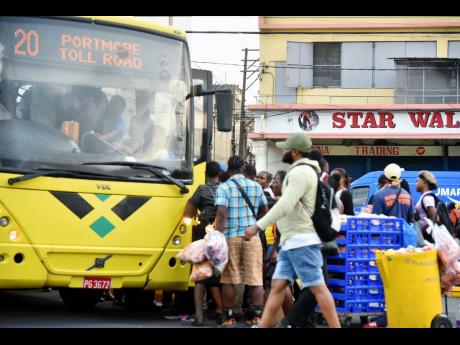Editorial | Transport policy, please
In his contribution to the Sectoral Debate last week, Daryl Vaz talked a lot about public transportation, which is one of his responsibilities as a Cabinet minister.
There was, for instance, his order to Jamaica’s telecoms providers to yank ride-hailing apps from their networks. That was in response to allegations that a young woman was abducted and murdered by a driver of a ride-hailing taxi who was previously convicted of sexual assault. Ride-share providers, Mr Vaz noted, operated outside of Jamaica’s regulatory framework for public passenger vehicles. Which, of course, has been known for more than three years, since the global originator of these arrangements, Uber, began operating in the island.
He also announced that the law is being amended to expand the powers of the industry’s regulator, the Transport Authority, whose legislative muscle will also be enhanced by the hiring 0f an additional 50 inspectors.
Mr Vaz also announced that 300 new buses are being bought for the Jamaica Urban Transit Company (JUTC) – the state-owned bus company that serves the Kingston Metropolitan Region – which taxpayers’ subsidies keep afloat. The JUTC’s operating loss in 2023 would have been close to $10 billion, except that a direct cash contribution of $8.3 billion allowed it to show a deficit of $1.4 billion. Of the new buses, 100, powered by compressed natural gas (CNG), should arrive on the island next month.
SUB-FRANCHISE
JUTC, the minister also disclosed, would shortly sub-franchise a further five of its routes – originating from Shortwood, Barbican, Duhaney Park, Whitehall/Havendale, Harbour View and ending in downtown Kingston via Half-Way Tree – to privately operated minibuses. Another 11 routes to be served by private operators are also being created.
Further, the government is contemplating a $10.62-billion-a-year transport initiative for rural students, whose parents now spend $8 billion annually to get them to and from school. The specifics of this arrangement were not disclosed.
There, too, were another of the periodic announcements of plans for private operators to revive the passenger services of the Jamaica Railway Corporation, or elements thereof, as well as proposals for the upgrading and expansion of the Montego Bay Metro, a government bus company.
Additionally, the government, according to the minister, will allow the transport sector to import older vehicles – up to 10 years old for cars, and 20 for buses. This scheme will be underpinned by the provision of “affordable and accessible loan(s)” to transport operators.
These were not the entirety of the minister’s offerings.
But while Mr Vaz spoke plenty about public transportation, much, if not all, of which will benefit commuters, his presentation fell significantly short of the mark. It felt like a mish-mash.
Rather, the presentation lacked overarching coherence. It was not the big, multisectoral transportation/commuter policy for which this newspaper has long advocated and which we hoped he would deliver.
Put another way, Mr Vaz’s programmes seems likely to add to the more than three-quarters of a million registered vehicle in the island, and implies either an acceptance that the government will build more roads, or expand the existing ones, to accommodate the greater number of automobiles, or that Jamaicans will have to live with worsening gridlock on their roads.
The government should reconsider.
TRANSPORTATION POLICY
We insist on a transportation policy that considers the commuter problems only of today, or next month, next year, or five years from now. Rather, a transport policy should consider how and where Jamaicans will live and work; and how they will commute over, say, the next 50 to 100 years.
In other words, transportation/commuter planning has to happen in tandem with spatial planning, land use policy, economic and development trends; as well as with how people live, work and play, plus the economics of commuting and its support infrastructure.
For instance, Jamaicans last year spent over US$417 million ($65 billion) importing passenger vehicles. Another US$160 million ($25 billion) was spent on spare parts. It cost an additional US$200 million or so ($31 billion) for the fuel to power these vehicles.
The Government spends billions more building new highways and widening existing roads to accommodate the increasing number of vehicles, which, with respect to privately owned and personally operated ones, mostly transport a single commuter, who, combined, each year, waste millions of man-hours stuck in traffic.
While an immediate fix must include traffic management, the larger, rational discourse has to include the question of private vehicle ownership, the drivers of this demand, and the likely trade-offs to an economic inefficiency of sitting in traffic for hours, as the single passenger, in an owner-driven motor car.
And in the event that the government considers that an alternative to what exists is unfeasible, it might consider what might be achieved with an investment of $120 billion a year, which is the approximate amount spent on buying, maintaining and operating passenger vehicles.

